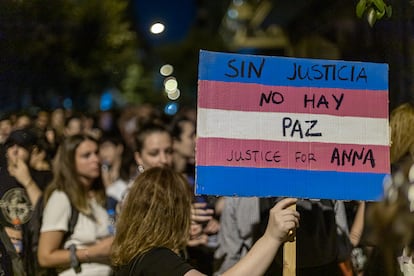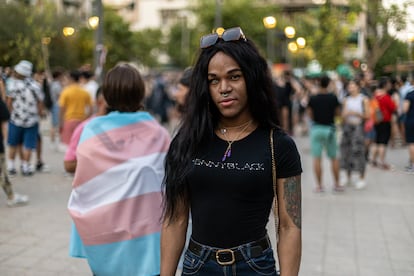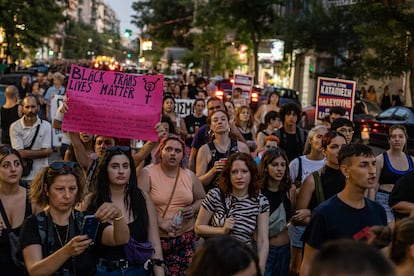Murder of Cuban trans woman fans flames of fight for LGBTQI+ rights in Greece
Anna Hernández fled the island so that she could live freely in a safe environment, finding solace in dance and support groups for refugees. Last Monday, she was found stabbed to death in her home in Athens


Anna Hernández was 46 years old and loved Greece. She was born in Cuba, but it was in her adopted country where she found her place in the world. While her life was never easy — she was Black, trans and poor — her friends remember her as a passionate, proud woman who never gave up.
Someone ended her life on Monday, July 10, stabbing Anna to death. Police have yet to identify any suspects. Her murder has shocked the LGBTQI+ communities in Greece — a collective in which Anna was very active and well-known.
On Monday night, Anna’s landlady, who had gone to collect the month’s rent, found her corpse. It was clear that she had been stabbed several times. Anna lived in Agios Panteleimonas, a neighborhood in northwest Athens that, a decade ago, was known as the stronghold of Golden Dawn: a neo-Nazi party, now outlawed as a criminal organization.
Anna arrived in Greece in 2017. At the height of the refugee crisis, she crossed the Balkans in the opposite direction of most refugees, with the aim of reaching northern Europe. She flew to Russia — one of the few countries where Cuban citizens don’t need a visa — and then went from Moscow to Serbia. There, she stayed in the first of several refugee camps which she would pass through. After that, she went to North Macedonia, before finally arriving in Greece.
Jorge Andrés is a Spanish photographer who, back then, was collaborating with a support group for LGBTQI+ refugees in Greece. Organizers asked him to meet with Anna, because she spoke Spanish. The connection was immediate. “We met for a coffee and, without realizing it, we spent seven hours chatting. She told me about her arrests in Cuba [because of transphobia], her decision to leave, the trip to Russia and the Balkans. I felt that, from that day onwards, I had a new sister,” he says by phone from Madrid.
The group that Jorge worked with was founded by the sisters Lía and Sofía Zachariadi. The association is called Emantes. Lía criticizes the fact that Greek law doesn’t consider LGBTQI+ people to be a “vulnerable population.” Because they don’t fall under this category, they face their asylum requests with an extra dose of difficulty when compared to heterosexuals. The complications begin from the very moment of registration in the system: trans people are required to use the name assigned to them at birth, instead of the one with which they recognize themselves. And refugee camps aren’t safe spaces for them. Sofía lists the reasons why: “[The camps] don’t cover the basic needs of decent accommodation. They’re not accessible, nor safe. But the main problem continues to be that there are no legal and safe ways to access Europe to request asylum.”

To receive asylum on the grounds of having been discriminated against in their home country, the applicant must provide proof of their gender identity or sexual orientation in their country of origin. In other words, they must show what — in most cases — they’ve been hiding all their lives. Ninoskha, a friend of Anna’s who is also Cuban, had her asylum request rejected by Greece, despite the fact that she knows “all the police stations in Havana.” She was arrested many times for being a trans woman, facing transphobia from a very young age. “I was the only [trans person] from my town,” she says, with a half-smile. She has appealed the decision and now awaits a new resolution of her file.
The first police report — reflected in an agency cable that was later republished by the local press — spoke of Anna as “a murdered man,” despite the fact that she was, for all intents and purposes (and legally), a woman.
Greece is a very conservative country. It’s near the bottom of the EU nations when it comes to respect for LGBTQI+ rights. In the southern European country, gay or lesbian couples cannot marry, nor can they register their partner’s children as their own, nor are they allowed to adopt children. The main advance occurred in 2017, when the government of the leftist Syriza party approved a law that depathologized trans identities and allowed for gender self-determination. Despite this, the extreme right wants to end the meager legislation that protects the rights of LGBTQI+ communities. In the elections that took place on June 25, three far-right blocs — all of which have an explicitly homophobic, transphobic and anti-LGBTQI+ discourse — achieved parliamentary representation.
Sofía Zachariadi notes that the consequences for LGBTQI+ people aren’t limited to the political debate: “We’ve already detected an increase in attacks after the elections. It’s a very hard blow that completely changes our agenda compared to when we started in 2016,” she tells EL PAÍS. The insecurity that LGBTQI+ refugees experience also means that most of the attacks go unreported, adds Lía. “They don’t feel safe in the face of a police force that doesn’t respect them, so when they’re attacked, they’re afraid to report it.” Many trans people prefer not to reveal their identity in public out of fear. Ninoskha explains it in simple words: “During the day, only trans Latina girls go out on the streets. You don’t see the Greek [trans people] anywhere during the day.”
Anna was exceptional in many ways. She never succumbed to the fear of being poor, Black and trans in a foreign country. “She was a very positive example for our group,” Sofía says. “She had very limited opportunities, but she knew how to take advantage of them and wanted to stay in Greece. She fought very hard.”
Anna’s passion was dancing. It was also her job. In Cuba, she received training in classical dance and salsa. “She was a bit [like] Celia Cruz,” Ninoskha proclaims. One of Anna’s great successes was dancing at Koukles, the most emblematic drag club in Greece, where important figures of the genre perform.
This past Tuesday afternoon, thousands of people gathered in Agios Panteleimonas square. Most belonged to LGBTQI+ communities, both local and migrant. Among them were Ninoskha, Lía and Sofía. The anger at what had happened was evident, both on the faces of those present and in the slogans they chanted. Harsh slogans, without euphemisms, which could be translated like this: “Anger and rage, we miss Anna”; “Anna lives, let’s hang the Nazis”; “We’re standing together with the sex workers, let’s deport the Nazis and the cops”; “Women and refugees, together, we’ll hang the Nazis”; “For every [machista] and transphobe, there’s a hottie with a tire iron.”

The mobilization of about 2,000 people became a spontaneous demonstration and was later divided into three parts. The first group wound through Filis Street, where brothels and houses inhabited by migrants abound, towards Victoria Square. The second group of marchers stopped for a long time in front of the doorway of Anna’s house, where a flag of the trans collective was displayed alongside a candle. The third bloc — the most confrontational — headed to Patision Avenue, one of the main arteries of Athens. In the distance, the Acropolis could be seen, an ancient structure that receives a record number of tourists, who are oblivious to any local news. Groups of very young girls (with their faces covered) crossed barriers, ready to confront the police, who were watching the protest from afar. They chanted a defiant slogan: “Let Greece die so that we can live. Fuck the family, fuck the country.” Shortly afterwards, the protest dissolved without any major incidents.
LGBTQI+ collectives have called for new protests in the upcoming days. Sofía expects a powerful and diverse mobilization. “Until now the queer movement has been mainly white. We want to [support] the refugee population, [so that they can] participate with force and have greater representation.” Jorge believes that mobilizing is the only thing they can do: “If we don’t take care of each other, we’re at a disadvantage.”
Being part of a group and being together in the street makes the grief more bearable. Yet, Ninoskha acknowledges that there’s widespread fear in the community. “I’ve never been afraid, but I’m terrified now, because we don’t know who killed Anna. He’s on the loose.”
Sign up for our weekly newsletter to get more English-language news coverage from EL PAÍS USA Edition
Tu suscripción se está usando en otro dispositivo
¿Quieres añadir otro usuario a tu suscripción?
Si continúas leyendo en este dispositivo, no se podrá leer en el otro.
FlechaTu suscripción se está usando en otro dispositivo y solo puedes acceder a EL PAÍS desde un dispositivo a la vez.
Si quieres compartir tu cuenta, cambia tu suscripción a la modalidad Premium, así podrás añadir otro usuario. Cada uno accederá con su propia cuenta de email, lo que os permitirá personalizar vuestra experiencia en EL PAÍS.
¿Tienes una suscripción de empresa? Accede aquí para contratar más cuentas.
En el caso de no saber quién está usando tu cuenta, te recomendamos cambiar tu contraseña aquí.
Si decides continuar compartiendo tu cuenta, este mensaje se mostrará en tu dispositivo y en el de la otra persona que está usando tu cuenta de forma indefinida, afectando a tu experiencia de lectura. Puedes consultar aquí los términos y condiciones de la suscripción digital.








































